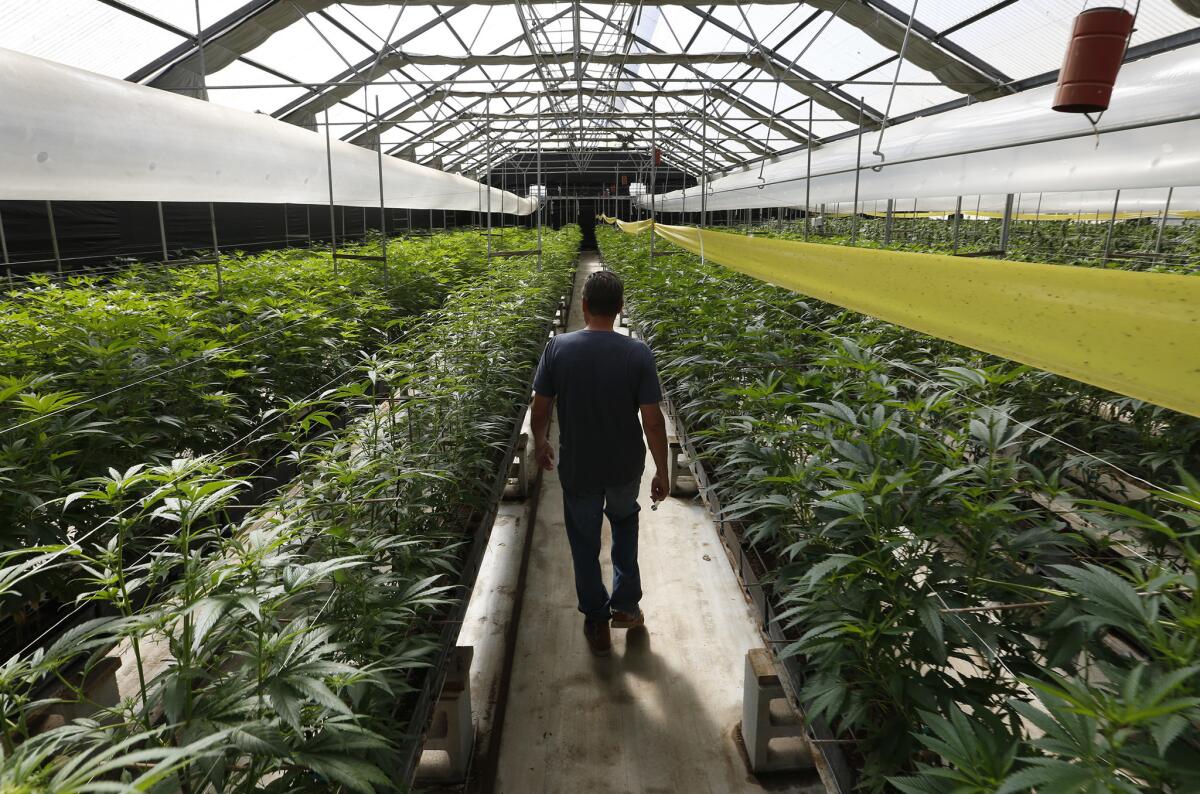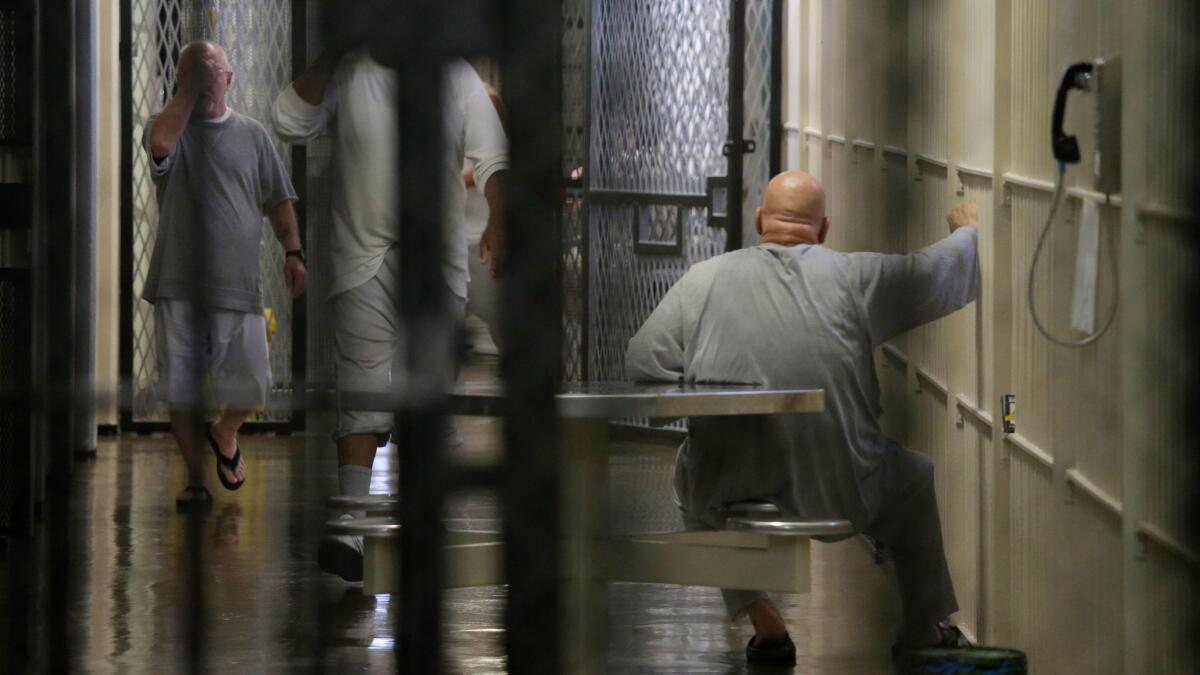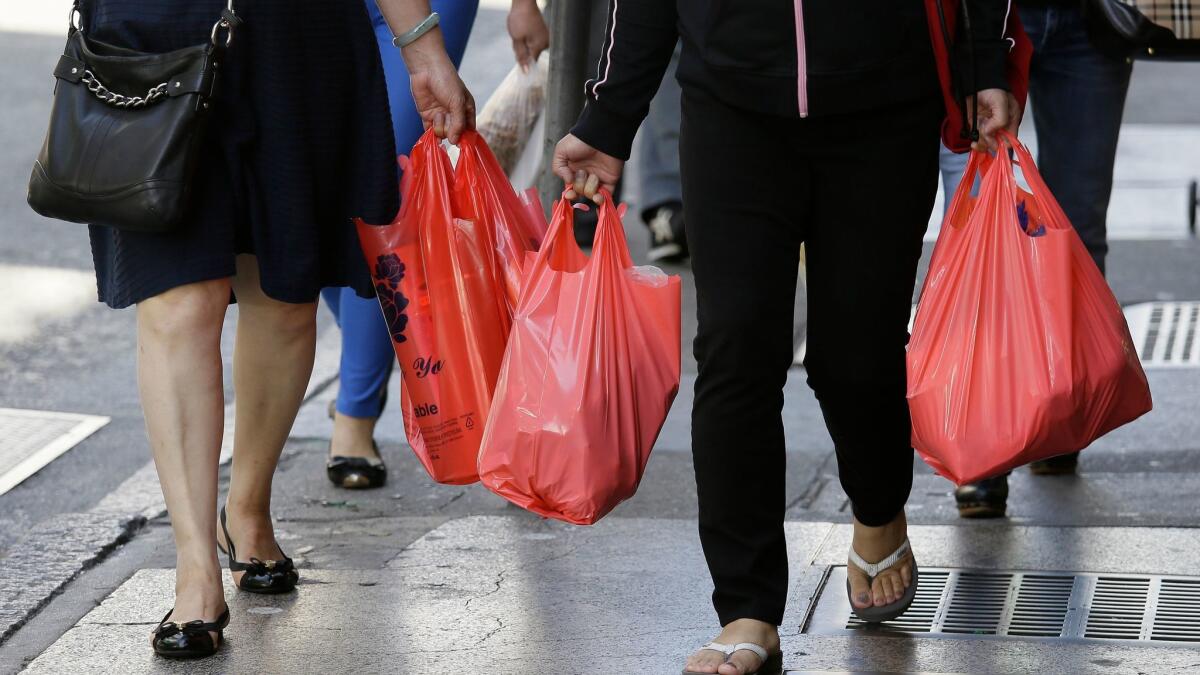Californians aren’t the only ones voting on marijuana, gun sales and the death penalty

Reporting from Las Vegas — Legalized pot. Tighter gun laws. Increased minimum wage. Even an initiative to limit initiatives. Across America, millions of voters will be asked to decide the fate of more than 150 ballot measures that seek to reshape local law.
California alone accounts for almost 10% of the approximately 160 ballot measures spread over 35 states. Here are a few to keep an eye on.
Guns

Two states will be deciding whether to expand background checks on gun sales.
Nevada and Maine have proposals that would eliminate the so-called gun show loophole by requiring federal background checks on firearm sales between private parties — including those at gun shows. The measures have set up a showdown between former New York Mayor Michael R. Bloomberg’s Everytown for Gun Safety nonprofit and the National Rifle Assn.
Washington, which already has a law requiring background checks for private party sales, is weighing a measure that would allow families or authorities to get a court order to restrict gun access when a person exhibits mental illness or indicates they may harm themselves or other people.
California, which has pushed for tougher gun restrictions at a faster rate than most states, will decide whether background checks must be completed on large-capacity ammunition magazines. It would also require most ammunition sales be made through licensed vendors and reported to the Department of Justice.
Minimum wage
Of the five states looking to change the minimum wage on this year’s ballot, only South Dakota is seeking to decrease it.
Voters in Arizona, Colorado, Maine and Washington will decide whether to increase the minimum wage. In Colorado, Arizona and Maine, it would increase to $12 an hour. Washington will consider a $13.75 an hour minimum wage. With the exception of Maine, the full increase would be in effect by 2020. The federal minimum wage is $7.25, but states have the right to set their own minimum. Currently, 29 states and Washington, D.C., have minimum wages above the federal standard.
South Dakota, however, is seeking to reduce its minimum wage for workers under 18 from $8.55 to $7.25 an hour.
What you need to know about the 17 propositions on November’s statewide ballot »
Marijuana
A slew of states will vote on various pot legalization measures ranging from recreational use to medicinal use.
Five states — California, Arizona, Nevada, Massachusetts and Maine — will decide on recreational use of marijuana while Arkansas, Florida, North Dakota and Montana will vote on the legal use of marijuana for medical purposes.
If all pass, it would make pot — medicinal or recreational — legal in 29 states.
Tobacco
Missouri and Colorado voters will vote on whether to increase taxes on tobacco products. Colorado smokers would see a price hike on a pack of cigarettes by $1.75 while Missouri would see an increase of 23 cents per pack of cigarettes.
The Colorado measure is an amendment to the state constitution and the revenue would largely go to health-related programs.
The measure in Missouri would also increase the tax on sellers of tobacco by 5% of the manufacturer’s invoice.
In California, voters will decide whether to raise the cigarette tax by $2 per pack.
Death penalty

Nebraska continues to grapple with the issue after lawmakers banned capital punishment when they passed a bill last year and then had to override Gov. Pete Ricketts’ veto.
A proposal was put on the ballot this year — backed by Ricketts — to reinstate the death penalty. Capital punishment is the law in 30 states.
California has two death penalty measures on the ballot: One seeks to repeal capital punishment in the state while the other modifies the existing structure. Proposition 62 is the repeal version, which would also retroactively apply to all prisoners currently on death row.
Proposition 66 would place a five-year limit on the appeals process for a person sentenced to death, and initial appeals would be handled by trial courts.
Because the measures offer opposite solutions, if both were to pass, the one with the highest vote total would become law.
Oklahoma is one of the states that still enforces capital punishment, but voters there will decide on amending the state constitution to carry out the death penalty by other means if one method is deemed invalid — as occurred in Nebraska when its sole means of execution, the electric chair, was ruled as cruel and unusual punishment by the state’s Supreme Court.
Tougher ballot initiative process
Colorado voters will decide if they want to see fewer attempts to amend their state constitution by elevating the signature requirement totals needed to qualify for the ballot.
Under the proposal, it would require any petition seeking to change the state constitution to collect signatures of 2% of registered voters in each of the state’s 35 districts. Then, if it qualified, it would have to be passed by 55% of the voters rather than by a simple majority.
Voting
People in Missouri, South Dakota, North Dakota, Maine and Colorado are among those who will vote on election rules.
Missouri voters will decide whether a person needs a government-issued picture ID to cast a ballot.
Colorado voters will decide whether unaffiliated voters can cast ballots in primaries without having to change their unaffiliated status. South Dakota will decide whether it will go to a nonpartisan primary system — though those rules wouldn’t apply to the presidential election.
And Maine will decide whether its elected officials will be selected through a ranking system. Under the ballot measure’s proposal, candidates will be picked by voters in order of preference. Then when votes are counted in rounds, the last-place candidates are eliminated until one candidate with the most votes in the final round is elected.
Health and related issues
Colorado is also notable this year for considering a ballot measure that echoes California and Oregon’s right-to-die initiatives passed recently. If passed, Colorado would join those two states along with Washington and Vermont as places where a terminally ill person with six months to live could obtain a lethal prescription from a willing doctor.
Colorado voters may also decide to set up a health insurance system designed to cover every state resident — a single-payer type of system that has its share of critics and backers. Called ColoradoCare, the proposed system is designed to replace private health insurance plans and would be run by a board of trustees. However, it wouldn’t replace Medicare.
A ballot measure in California also will look to tackle high prescription drug costs by not allowing state agencies to pay more than the lowest price for the same drug by the United States Department of Veterans Affairs.
Other issues

Voters in Colorado will choose whether to remove slavery from its constitution. The state’s constitution currently allows for slavery as punishment for a crime. The ballot measure would eliminate slavery as an option.
In California, voters will decide whether adult film stars should be required to wear condoms during the filming of sex scenes. The measure would also require film producers to pay for medical tests related to sexually transmitted diseases.
The state’s voters will also consider two plastic grocery bag measures. One would seek to ban single-use plastic bag sales by upholding an existing law passed by the Legislature, while the other would direct money from plastic bags to an environmental protection fund run by the state. If both initiatives pass, the one with the highest vote total would become law.
There there’s Washington, D.C.
It will make a play for statehood under a ballot measure that would split the district into residential areas (a state) and federal properties. The proposal was pushed by the mayor and is supported by Democratic presidential nominee Hillary Clinton.
Twitter: @davemontero
ALSO
Defeat is likely for both death penalty measures on California ballot, poll finds
California voters support gun control initiative, Proposition 63, poll says
Younger voters overwhelmingly favor marijuana measure, which is likely to pass, poll finds
More to Read
Get the L.A. Times Politics newsletter
Deeply reported insights into legislation, politics and policy from Sacramento, Washington and beyond. In your inbox three times per week.
You may occasionally receive promotional content from the Los Angeles Times.











